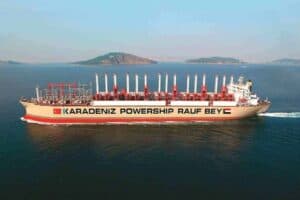The whole Karpowership project will not happen anymore, but Outa still wants to know how the decision to approve it was reached.

Civil organisation Organisation Undoing Tax Abuse’s (Outa) challenge to Karpowership’s generation licences will go ahead in court in June despite the fact that Karpowership has withdrawn its opposition to the case. The National Energy Regulator of South Africa (Nersa), on the other hand, continues to oppose the application.
Outa says it is gearing up for an application to compel Nersa to provide it with the full, unredacted record of its decision to approve generation licences for Karpowership.
Karpowership withdrew its opposition to the application to compel production of the record as well as the main application calling for a review of Nersa’s licence decision. The application is set down for hearing on 4 to 6 June 2024 in the Pretoria High Court
“Interestingly, on 17 May 2024, Outa received a notice of withdrawal from Karpowership, withdrawing from the application to compel the main (review) application. This is surprising and begs the question what the reason for the sudden change of heart could be,” Advocate Stefanie Fick, executive director of the accountability division at Outa, says.
ALSO READ: ‘State capture on steroids,’ says Karpowership JV partner
Outa filed an application for the review and setting aside of the decisions by Nersa to grant the three Karpowership independent power producer (IPP) generation licences in April 2022. Nersa and Karpowership opposed this application.
“We believe that Nersa has displayed a cavalier attitude towards statutory compliance and public concerns throughout its decision-making process to award generation licences to Karpowership. By doing so, it failed to properly exercise its mandate and fulfil its oversight functions without the necessary independent checks and balances to ensure that the interests of electricity suppliers are balanced with the interests of customers, the public and the South African economy,” Fick says.
‘Nersa’s decision-making procedurally unfair’
Outa believes that Nersa’s decision-making was procedurally unfair. “The process was premature and lacking in transparency, which is why Outa called for Nersa to provide copies of all documents relating to the decisions to grant Karpowership the generation licences, together with the reasons for the decisions within 15 days in the main application.”
ALSO READ: Expert calls on govt ‘to come clean’ on controversial Karpowership deal
Fick says the National Energy Regulator Act requires that every decision of Nersa must be “in the public interest” and “based on reason, facts and evidence”. “This act also provides for the judicial review of Nersa decisions in terms of the Promotion of Administrative Justice Act.”
Despite Outa’s request for transparency, Nersa provided only a redacted record and Outa was therefore obliged to compel Nersa to produce the full and unredacted record of its decisions to approve generation licences to Karpowership on 23 January 2023.
In addition, the Karpowership IPPs failed to meet the department of mineral resources and energy’s final extended deadline for financial and legal closure for Risk Mitigation IPP Procurement Programme (RMIPPPP) projects.
Eskom subsequently said that the grid access for those projects expired on 31 December and no further extensions would be granted and therefore, Karpowership lost its grid access.
ALSO READ: R200bn Karpowership deal facing dual court challenges from Outa, fishing communities
Support Local Journalism
Add The Citizen as a Preferred Source on Google and follow us on Google News to see more of our trusted reporting in Google News and Top Stories.






